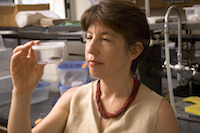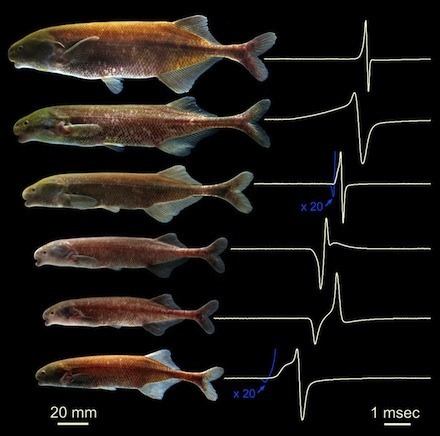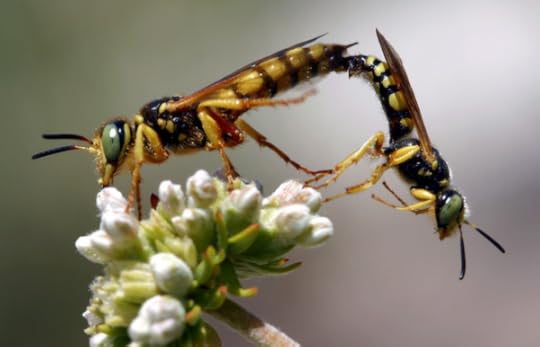Carl Zimmer's Blog, page 85
August 2, 2010
A Prize For Young Scientists Who Reach Out
A new prize from AAAS recognizes one of the most important things a scientist can do:
AAAS Early Career Award for Public Engagement with Science
Nomination Deadline: 15 October
The Award
The AAAS Early Career Award for Public Engagement with Science, established in 2010, recognizes early-career scientists and engineers who demonstrate excellence in their contribution to public engagement with science activities. A monetary prize of $5,000, a commemorative plaque, complimentary registration to...
August 1, 2010
More on the meaning of sexiness
 As I hoped, Marlene Zuk, a biologist at UC Riverside, has chimed in with her own thoughts on Friday's post on the meaning(lessness) of sexual displays. Check it out!
As I hoped, Marlene Zuk, a biologist at UC Riverside, has chimed in with her own thoughts on Friday's post on the meaning(lessness) of sexual displays. Check it out!

July 30, 2010
The end of Sex Week and the start of SciFoo
I hope you enjoyed Sex Week (in a purely intellectual way, of course). I'm now off to a confab called SciFoo, which I've heard a lot about over the years and am now finally able to attend. Each year, Google and O'Reilly Media bring together a motley crew of scientists, writers, and others, and basically tell them to make up a conference on the spot. There are a whole bunch of people on the attendee list that I've waited years to meet in person, so it will definitely be worth the trip to...
The End of Sex Week: Darwin, Sex, and Dada
 [This is the last post for Sex Week]
[This is the last post for Sex Week]
The animal kingdom is filled with wild extravagances, and a lot of them have something to do with sex. Hermit crabs wave their claws, swordtail fish flash their swordtails, manakins leap and buzz their wings. Darwin considered these displays so important and so puzzling ("the sight of a feather in a peacock's tail, whenever I gaze at it, makes me feel sick!" he wrote to a colleague), that he dedicated half of a book to the subject.
Darwin argued that many...
July 29, 2010
Sex Week continued: Water strider blues
[This is my third post of Sex Week]
Here's a song for the male water strider, from the days when Rod Stewart could do no wrong:
In my first two posts for Sex Week, I wrote about the delights of courtship: the alluring, informative fragrance of yeast and the seductive buzz of electric fish. These signals stir the opposite sex into action–to creep towards a fellow fungus, or to head-butt a prospective mate. But in many species, the actual consummation that all that courtship leads up to does not ...
July 27, 2010
Sex Week continued: when love shocks
 [This is my second post of Sex Week]
[This is my second post of Sex Week]
In the sexual universe, all sorts of things can feel good, even if we human have a hard imagining how they can bring any pleasure. Electricity, for example, may be nothing for us beyond a painful shock. But for some fishes, it is the essence of desire.
The rivers and lakes of central Africa are home to a couple hundred species of fishes called mormyrids. Their tails are packed with special cells that can produce electric discharges, and they use other...
July 26, 2010
Gonna Have A Fungal Good Time [With Apologies to James Brown]
If yeast could sing, it might sound something like this.
This single-celled fungus–for which we should give thanks for bread, beer, and wine–can reproduce in several ways. Most of the time, it produces buds that eventually split off as free-living cells of their own. Its daughters are identical to itself, carrying the same two sets of chromosomes. Sometimes, however, life get rough for yeast, and they respond by making spores, each with only one set of chromosomes. Later, when times get...
It's sex week on the Loom

Birds do it, bees do it, even educated viruses do it. And for some reason my stack of interesting scientific papers is particularly heavy at the moment with research on the evolution of sex. So let's not be shy. All this week, I will blog about sex.
[Image: mating sand wasps, Alex Wild]
July 21, 2010
Details on My Writing Class This Fall At Yale
It's terrifying to think that we're weeks away from the fall semester, but so it seems. I will once more be teaching an upper-level seminar at Yale called "Writing About Science and the Environment." Last year's class was a wonderful experience, and I'm hoping to apply some of the lessons I learned about teaching to this fall's edition.
I've just uploaded my new and improved syllabus to the Yale web site. So if you are at Yale (undergraduate or graduate), check it out at the university...
July 20, 2010
The Microbiome Never Ceases to Amaze
 While I was away last week on vacation, the New York Times published my feature on the hidden jungle that each of us carries, known as the microbiome. I was very happy to come home to a lot of kind notes, tweets, and various communications about it. Yet I would never claim that my article delivered the Big Scoop on the subject. After all, we've known about the microbiome ever since Antonie Philips van Leeuwenhoek scraped his teeth over 300 years ago and discovered wee animacules in the scum. ...
While I was away last week on vacation, the New York Times published my feature on the hidden jungle that each of us carries, known as the microbiome. I was very happy to come home to a lot of kind notes, tweets, and various communications about it. Yet I would never claim that my article delivered the Big Scoop on the subject. After all, we've known about the microbiome ever since Antonie Philips van Leeuwenhoek scraped his teeth over 300 years ago and discovered wee animacules in the scum. ...





